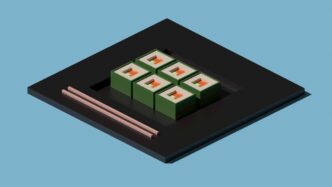OQC’s Vision for Quantum Advancement
Oxford Quantum Circuits (OQC) isn’t just building quantum computers; they’re charting a course for the entire field. Their vision is pretty ambitious, focusing on making quantum technology more accessible and practical. It’s not just about raw power, but about how we can actually use it.
Pioneering Quantum Architectures
OQC is really pushing the envelope when it comes to how quantum computers are put together. They’re looking at different ways to build these machines, moving beyond just one-size-fits-all designs. Think of it like building with LEGOs, but for quantum bits. They’re exploring modular approaches, which means you could potentially add more processing power or specialized components as needed. This flexibility is key for future growth.
- Superconducting Qubits: OQC uses superconducting circuits, which are a popular choice for building qubits. They’re working on making these qubits more stable and easier to control.
- Coherence Times: A big challenge is keeping qubits in their quantum state for long enough to do useful calculations. OQC is focused on improving these "coherence times."
- Connectivity: How qubits talk to each other is super important. OQC is designing architectures that allow for better connections between qubits, which is vital for running complex algorithms.
Advancing Qubit Technology
At the heart of any quantum computer are the qubits themselves. OQC is investing a lot of effort into making their qubits better. This means not just having more of them, but making sure they are high-quality. High-quality qubits are less prone to errors and can perform calculations more reliably. They’re looking at ways to reduce noise and interference, which are the enemies of delicate quantum states.
The OQC Quantum Ecosystem
Beyond the hardware, OQC understands that a quantum computer needs a whole support system to be useful. This includes the software, the tools developers use, and how it all connects to the outside world. They’re working on building an ecosystem that makes it easier for researchers and businesses to get involved with quantum computing. This means:
- User-Friendly Interfaces: Making it simpler for people who aren’t quantum physicists to interact with their machines.
- Integration: Finding ways to connect their quantum systems with existing classical computing resources.
- Collaboration: Building partnerships to drive innovation across the board.
Innovations in Quantum Computing
Next-Generation Qubit Design
OQC isn’t just tinkering; they’re really pushing the boundaries on what a qubit can be. Think beyond the standard superconducting circuits. They’re exploring new materials and designs that could lead to qubits that are more stable and less prone to errors. This is a big deal because, right now, decoherence – that’s when a qubit loses its quantum state – is a major headache. Better qubits mean we can run more complex calculations for longer periods. It’s like trying to build a skyscraper on shaky ground versus solid bedrock; the latter just lets you build higher and more reliably.
Scalable Quantum Systems
Building a few qubits is one thing, but building thousands or even millions? That’s a whole different ballgame. OQC is focused on architectures that can actually grow. They’re looking at modular designs, where you can link smaller quantum processors together. This approach seems more practical than trying to cram everything onto one giant chip. It’s a bit like how supercomputers are built from many smaller, interconnected units. This scalability is key to moving from the current noisy, intermediate-scale quantum (NISQ) era to something much more powerful.
Hybrid Quantum-Classical Approaches
Let’s be real, quantum computers aren’t going to replace your laptop anytime soon. The smart money is on hybrid systems. This means using quantum computers for the parts of a problem they’re good at – like certain types of optimization or simulation – and then using classical computers for everything else. OQC is developing ways to make these two types of computing work together smoothly. It’s about finding the best tool for each job. This approach is particularly relevant for tackling complex problems in areas like chemistry and materials science, where a full quantum solution might be too far off.
OQC’s Roadmap to Quantum Supremacy
Oxford Quantum Circuits (OQC) isn’t just building quantum computers; they’re charting a course towards what’s often called ‘quantum supremacy,’ though the term itself is debated. It’s more about reaching a point where quantum computers can solve problems that are practically impossible for even the most powerful classical supercomputers. OQC’s strategy involves several key phases, focusing on steady, measurable progress.
Milestones in Quantum Development
OQC is breaking down the journey into manageable steps. They’re not aiming for a single giant leap but a series of advancements that build on each other. Think of it like climbing a mountain – you reach base camps along the way, each one offering a better view and a chance to prepare for the next ascent.
- Increasing Qubit Count and Quality: This is a big one. More qubits mean more processing power, but they also need to be stable and accurate. OQC is focused on improving coherence times and reducing error rates.
- Developing Advanced Error Correction: Quantum systems are fragile. OQC is working on techniques to detect and fix errors that pop up during computation, which is vital for complex tasks.
- Building Larger, More Integrated Systems: Moving from small, experimental setups to larger, more robust machines is a major hurdle. OQC’s roadmap includes scaling up their hardware.
Achieving Quantum Advantage
Quantum advantage is the point where a quantum computer can perform a specific, useful task faster or more efficiently than any classical computer. It’s not about doing everything better, but finding those niche problems where quantum shines. OQC is targeting areas like materials science and drug discovery where complex simulations are needed.
The goal is to move beyond theoretical possibilities and demonstrate real-world utility. This means showing that their quantum computers can provide tangible benefits for scientific research and industry.
The Future of OQC’s Technology
Looking ahead, OQC envisions a future where their quantum computers are not just powerful but also accessible and integrated into existing research workflows. They’re thinking about:
- Hybrid Quantum-Classical Computing: Combining the strengths of quantum and classical computers to tackle problems that neither could solve alone.
- Specialized Quantum Processors: Developing hardware tailored for specific types of problems, rather than a one-size-fits-all approach.
- Cloud Accessibility: Making their advanced quantum systems available to researchers and developers through cloud platforms, lowering the barrier to entry.
OQC’s Contribution to Quantum Software
Beyond the hardware, OQC is also putting a lot of thought into the software side of quantum computing. It’s not enough to just build powerful quantum machines; you need the tools to actually use them effectively. OQC is working on making quantum software more accessible and useful for everyone.
Developing Quantum Algorithms
Figuring out how to actually solve problems with quantum computers is a big deal. OQC is involved in creating new ways to use quantum computers for specific tasks. This means developing algorithms that can take advantage of quantum mechanics to do things classical computers can’t, or can’t do efficiently. Think about complex simulations for materials science or drug discovery – these are areas where new quantum algorithms could make a huge difference. They’re also looking at how to optimize existing algorithms, making them run better on current and future quantum hardware.
Enhancing Quantum Circuit Design
Quantum computers work by manipulating qubits through a series of operations, often represented as circuits. OQC is focused on improving how these circuits are designed and managed. This includes making them more efficient, easier to understand, and adaptable to different types of quantum hardware. They’re exploring ways to break down complex circuits into smaller, manageable pieces that can be run on available quantum processors, especially as we move towards larger, more complex systems. This work is key to bridging the gap between theoretical quantum algorithms and practical implementation.
Tools for Quantum Developers
To get more people working with quantum computers, you need good tools. OQC is contributing to the development of software development kits (SDKs) and programming languages that make it easier for developers to write, test, and run quantum programs. This involves creating user-friendly interfaces and libraries that abstract away some of the low-level complexities of quantum computing. The goal is to lower the barrier to entry, allowing more researchers and developers to experiment with quantum computing and contribute to its growth.
The OQC Quantum Computing Platform
Oxford Quantum Circuits isn’t just building quantum computers; they’re thinking about how these machines fit into the bigger picture. Their platform is designed with a few key ideas in mind, making quantum computing more accessible and useful.
Modular Quantum Architectures
OQC is really pushing the idea of modularity. Instead of one giant, monolithic quantum computer, they’re building systems that can be connected together. Think of it like building with LEGOs – you can add more blocks as you need them. This approach means they can scale up their quantum processors more easily. If you need more qubits or more power, you can just add another module. This is a pretty smart way to grow without having to start from scratch every time.
Distributed Quantum Computing
Building on the modular idea, OQC is also looking at how to link these quantum modules together, even if they’re not right next to each other. This is what they call distributed quantum computing. It’s like having a network of smaller quantum computers that can work together on a problem. This could be really useful for tackling really big challenges that a single machine might not be able to handle. It also opens up possibilities for sharing quantum resources more widely.
Quantum Network Integration
Finally, OQC is thinking about how their quantum computers can talk to other quantum devices and even classical computers. This is about integrating their quantum systems into existing networks. Imagine being able to send quantum information securely between different locations or using quantum computers as part of a larger computing infrastructure. This focus on connectivity is key to making quantum computing a practical tool for more people and more applications. It’s not just about having a powerful quantum processor; it’s about making it work with everything else.
OQC’s Impact on Quantum Research
Advancing Quantum Simulation
Oxford Quantum Circuits (OQC) is really pushing the boundaries when it comes to quantum simulation. Think about it – simulating complex molecules for drug discovery or understanding new materials. It’s a huge deal. OQC’s hardware is being used to tackle these kinds of problems, allowing researchers to model systems that are just too complicated for even the most powerful regular computers. They’re not just building the machines; they’re enabling scientists to actually do the science.
Quantum Machine Learning Innovations
Machine learning is already changing so much, and adding quantum power to it? That’s where things get really interesting. OQC’s work is helping to develop new ways to use quantum computers for machine learning tasks. This could mean faster training for AI models or entirely new types of algorithms that can find patterns we can’t even imagine right now. It’s about making quantum computers smarter, not just faster.
OQC’s Role in Quantum Networking
Quantum networking is still pretty new, but it’s got massive potential for secure communication and distributed quantum computing. OQC is playing a part in this by developing the hardware that could form the backbone of these future networks. Imagine linking quantum computers together – that’s the goal, and OQC is building the pieces to make it happen. It’s a bit like building the internet, but for quantum information.
Looking Ahead
So, what does all this mean for the future? Oxford Quantum Circuits is clearly aiming high, and their roadmap shows they’re thinking about how to actually build and use these powerful quantum computers. It’s not just about theory anymore; it’s about making things work in the real world. While there are still plenty of hurdles to jump, seeing companies like OQC lay out such a clear plan is pretty exciting. It suggests we’re moving past the ‘what if’ stage and getting closer to seeing quantum computing make a real difference. Keep an eye on OQC, because they seem ready to play a big part in what’s next.














